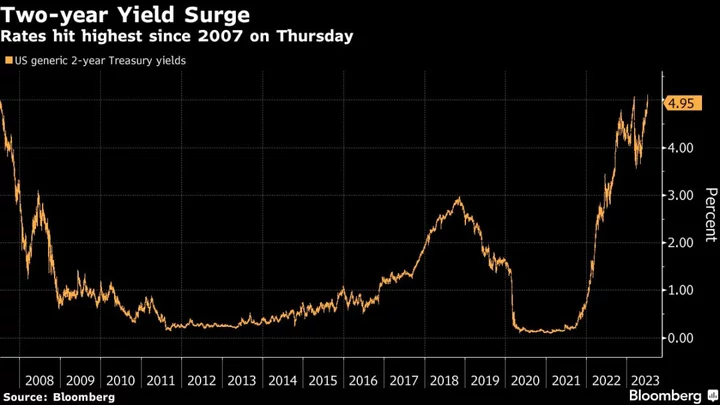Former Treasury Secretary Lawrence Summers warned against any sense of achievement by policymakers in bringing inflation down notably from its peak last year, and predicted a further selloff in bonds as investors adjust to the need for more monetary tightening.
“Nobody ever thought we were an underlying 8% inflation country,” Summers said on Bloomberg Television’s “Wall Street Week” with David Westin. “So the fact that the rate has come down shouldn’t be confused with saying that ‘we can be confident that we’re on a path of this all being OK.’”
Summers spoke hours after Friday’s US jobs report, which he characterized as a “hot” set of numbers, with a payroll gain of 209,000 for June that was effectively double the growth of the adult US population. The release also showed a bigger-than-expected advance in wages, to 4.4% for the year through June.
Other strong data include a strengthening in the housing market and improving consumer confidence. While some indicators have suggested signs of a softening in the economy, the bond market has sold off in the expectation the Federal Reserve will have to raise interest rates further.
Two-year Treasury yields on Thursday hit their highest level since 2007, surpassing 5%, while five-year yields headed toward the 2007 highs hit in October. Futures prices indicate the Fed will hike rates at least once more this year.
Further ‘Adjustment’
“You’ve seen an appropriate adjustment in medium-term interest rates to this reality” of the Fed’s need to do more, said Summers, a Harvard University professor and paid contributor to Bloomberg TV. “My best guess is that you’re going to see further adjustment as the data continues to come in.”
Next week, the consumer price index is forecast to show a tumble in the headline annual inflation rate, with the Bloomberg survey currently suggesting a 3.1% pace for June. That would be down from 4% in May and a peak above 9% in June 2022. The core rate, excluding food and energy, is seen at 5%.
The Fed’s target is for a 2% inflation rate, using a separate gauge known as the PCE price index. In May, that was up 3.8% from a year before, or almost double policymakers’ goal.
“Since we haven’t yet had a significant slowdown in economic activity, it shouldn’t be surprising that we’ve still got inflation well above target,” Summers said.
As for monetary policy, the best guess has to be that “if the Fed wants to see inflation get back to its target, it’s going to have to raise rates enough that, at some point, the economy suffers a downturn,” he added.
Affirmative Action
Summers, who previously served as Harvard’s president, also criticized the Supreme Court’s recent ruling against the university over the use of race in admissions. At this point, elite colleges have two options, he said.
They can “gerrymander” application criteria, such as doing away with standardized testing and encouraging applicants to write “certain” things in their personal essays, Summers said. That approach would invite broader public resentment, “diminish the intellectual quality of their classes” and end up doing “very little to promote social justice,” he said.
What Summers advocated was a host of reforms to bolster their “overall contribution to opportunity in America.”
Among the steps:
- An end to “legacy” admissions, where colleges give an edge to candidates whose relatives attended.
- No “special admissions” for those who’ve been coached, or are good at “aristocratic sports.”
- An expansion in class sizes.
- Training for teachers during summers, and training “able students” in computers.
- Collaborating to help strengthen public schools.
(Updates with remarks on affirmative action ruling, starting after ‘Affirmative Action’ subheadline.)

